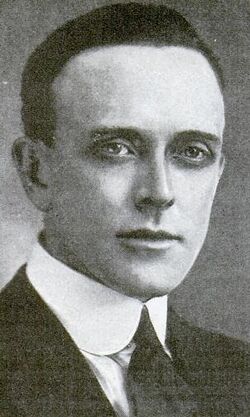Biography:Daniel Frost Comstock

Daniel Frost Comstock (/ˈkɒmstɒk/; August 14, 1883, Newport, Rhode Island – March 2, 1970, Concord, Massachusetts)[1][2][3][4] was an American physicist and engineer.[5]
Biography
Comstock attained a B.S. from the Massachusetts Institute of Technology in 1904. He also studied in Berlin, Zürich, and Basel, where he attained his Ph.D. in 1906. At the University of Cambridge (1906–1907) he studied under J. J. Thomson. Beginning in 1904 he was a member of the faculty at MIT in theoretical physics (assistant professor 1910–1915; associate professor 1915–1917).[6]
Comstock is most well known as the co-founder of the company Kalmus, Comstock & Westcott, and of Technicolor Motion Picture Corporation, which developed the second major color film process, after Britain's Kinemacolor, and the most widely used color motion picture process in Hollywood from 1922 to 1952.[7][8]
Comstock also published some theoretical papers in the fields of electrodynamics (1908), special relativity (1910a) (see History of special relativity), and emission theory (1910b).
Publications
- Comstock, D.F. (1908), "The Relation of Mass to Energy", Philosophical Magazine, 6 15 (85): 1–21, doi:10.1080/14786440809463743, https://zenodo.org/record/1430844/files/article.pdf
References
- ↑ Record for Daniel Frost Comstock. Ancestry.com. World War I Draft Registration Cards, 1917-1918 [database on-line]. Provo, UT, USA: Ancestry.com Operations Inc, 2005.
- ↑ Record for Daniel Frost Comstock. Ancestry.com. U.S. World War II Draft Registration Cards, 1942 [database on-line]. Provo, UT, USA: Ancestry.com Operations Inc, 2007.
- ↑ "Dr. Daniel Comstock, 86, Dies; Helped to Develop Technicolor", The New York Times, March 4, 1970, p. 30.
- ↑ Record of Daniel F. Comstock. Ancestry.com. Massachusetts Death Index, 1970-2003 [database on-line]. Provo, UT, USA: Ancestry.com Operations Inc, 2005.
- ↑ "Daniel Comstock Worked on Development of Technicolor". Physics Today 23 (5): 92–93. May 1970. doi:10.1063/1.3022148.
- ↑ Cattell and Brimhall, American Men of Science, Third Edition (1921), p. 140
- ↑ "What? Color in the Movies Again?" Fortune, October 1934.
- ↑ Tom Huntington, AmericanHeritage: FROM BLACK & WHITE TO TECHNICOLOR
